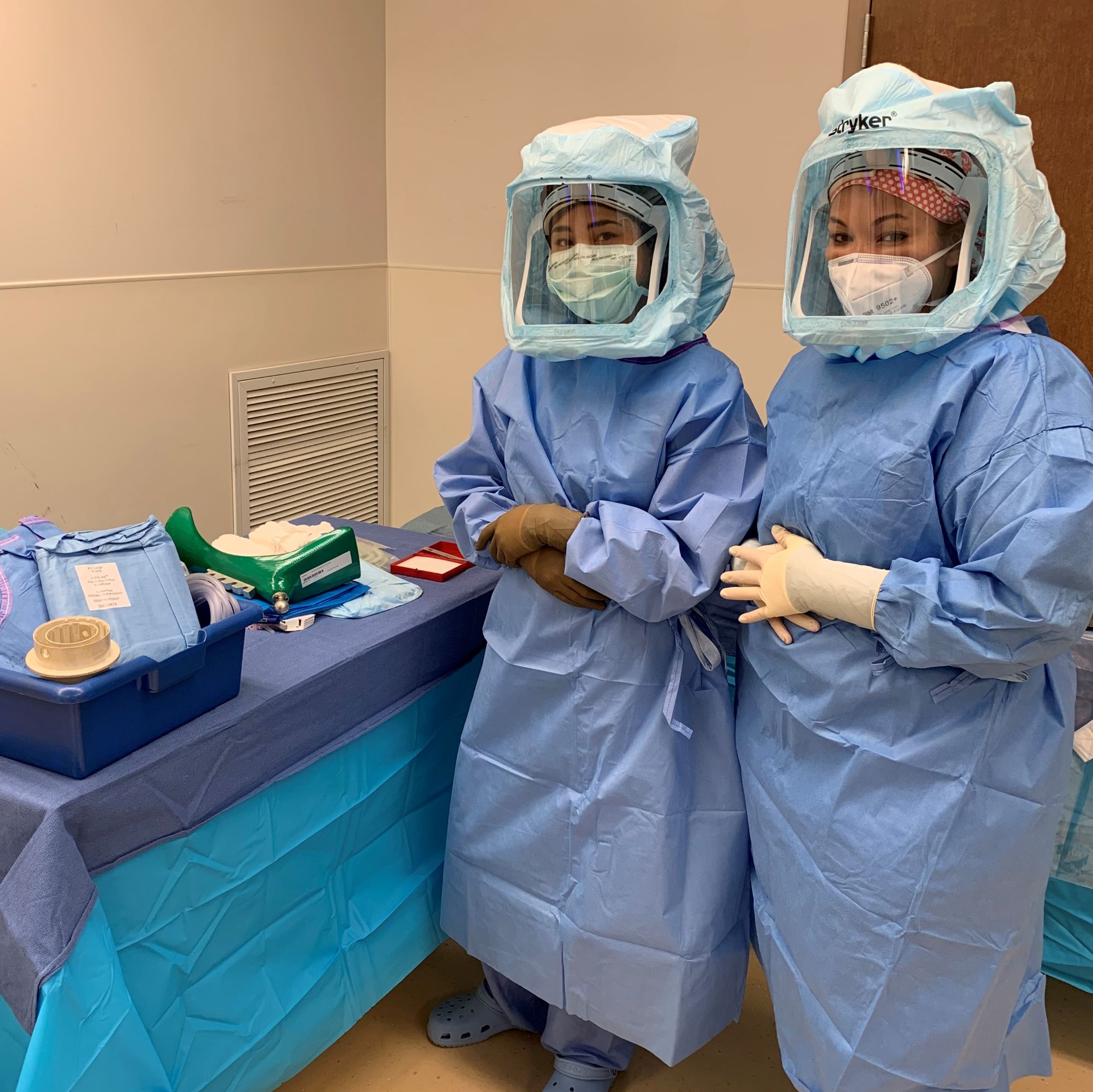BJC Collaborative’s history of sharing helps member systems weather the pandemic
 The challenges brought by COVID-19 have strained some U.S. health care systems to their limits. But the BJC Collaborative member systems are taking on those challenges by doing what they’ve done for almost eight years — joining forces and getting to work.
The challenges brought by COVID-19 have strained some U.S. health care systems to their limits. But the BJC Collaborative member systems are taking on those challenges by doing what they’ve done for almost eight years — joining forces and getting to work.
The BJC Collaborative was created in October 2012 when a group of leading, not-for-profit health systems came together with the goal of enhancing the quality of and access to health care in the communities they serve, while reducing the total cost of care in the region.
With 50 hospitals and almost 73,000 employees, the health systems within the BJC Collaborative span a service area that includes a population of 11 million people across seven states.
Member systems include Missouri-based BJC HealthCare in St. Louis, Saint Luke’s Health System in Kansas City and CoxHealth in Springfield; and Illinois systems Memorial Health System in Springfield, Blessing Health System in Quincy, Southern Illinois Healthcare (SIH) of Carbondale and Sarah Bush Lincoln Health System of Mattoon.
History of impact
By pooling individual strengths and sharing crucial information and resources, the BJC Collaborative members have made a significant impact on patients and communities and positioned themselves to navigate an evolving, uncertain health care future.
For instance, Collaborative members have established new clinical relationships that let patients receive specialty consultation, treatment and follow-up care through virtual care services provided at local clinics. Collaborating on clinical engineering, supply chain and information technology assets and contracting saved more than $260 million in five years. The Collaborative Care Management Resources (CCMR) group members have focused their efforts on their employee health plan and have ultimately improved the quality and reduced the total cost of care for diverse patient populations across Missouri and southern Illinois.
It’s this history of shared effort and resources that has proved exceptionally valuable when confronting the unforeseen and unprecedented challenges of the COVID-19 pandemic.
‘Flying blind’
In early 2020, a previously unknown coronavirus spread rapidly across the globe, rocking health care infrastructure around the world. Health care leaders in the Midwest knew they’d soon meet unprecedented challenges.
Because solid data on the new virus was scarce, communication and sharing information were critical, especially early in the outbreak. In early to mid-March, even though member systems across the BJC Collaborative were busy responding to COVID-19 in their local communities, their leaders continued to make time to meet virtually to share their challenges, strategies and solutions.
 “An opening comment during CoxHealth’s first incident command meeting was, ‘We are flying blind and backwards — we know very little about this disease,’” says Steve Edwards, CoxHealth president and CEO. “Having absolute trust in members of the Collaborative allowed each organization to rapidly share information and best practices. This informed our decision making, enabling us to quickly evolve our organization to better protect our employees and community.”
“An opening comment during CoxHealth’s first incident command meeting was, ‘We are flying blind and backwards — we know very little about this disease,’” says Steve Edwards, CoxHealth president and CEO. “Having absolute trust in members of the Collaborative allowed each organization to rapidly share information and best practices. This informed our decision making, enabling us to quickly evolve our organization to better protect our employees and community.”
Sandra Van Trease, BJC group president, noted that by working together, Collaborative members were able to help shape the regional response to the pandemic.
 “The senior leadership of our Collaborative members and their clinical colleagues realized that if COVID-19 was anywhere in our respective communities, it was everywhere,” she says. “Thus, our organizations were in a unique position to lead both locally and regionally to address the impact on our patients, our staff, our clinical professionals and our communities.
“The senior leadership of our Collaborative members and their clinical colleagues realized that if COVID-19 was anywhere in our respective communities, it was everywhere,” she says. “Thus, our organizations were in a unique position to lead both locally and regionally to address the impact on our patients, our staff, our clinical professionals and our communities.
“Working together, and sharing information and strategies both during the initial wave of COVID-19, as well as during the re-opening of services as the curve began to flatten, enabled each Collaborative member to bring its real-time experience and expertise to the table and played a pivotal role in managing the pandemic in our region.”
Representatives from within each member institution met virtually to share best practices, discuss obstacles and plan for the safety of their patients and employees.
Those meetings included:
- human resources, legal, emergency preparedness and clinical quality roundtables
- virtual care, cybersecurity and government relations councils
- a newly formed surgical services group
- the Collaborative Care Management Resources (CCMR) group
- senior leadership from each member system
Collaborative members strategized ways to cope with the new problems posed by COVID-19 and come up with new solutions. For example, they talked through the processes of placing triage areas outside of emergency departments and setting up drive-through testing sites.
The metrics, measures and key performance indicators group shared best practices for formulating useful COVID-19 data.
Human resources leaders talked frequently, discussing issues from remote work to compensation changes to furloughs.
When sourcing personal protective equipment (PPE) and other essential supplies became difficult, Collaborative partners were able to help each other. For instance, BJC supply chain shared surgical gowns with Sarah Bush Lincoln when suppliers dried up and referred SIH to new supply sources.
Unplanned expansion in virtual care
While health care has moved increasingly toward the cyberworld in recent years, with electronic health records and virtual doctor’s visits becoming more common, COVID-19 led many providers to accelerate the move of more functions online. The BJC Collaborative has focused on helping members adapt to this change.
The Collaborative’s clinical quality transformation committee shared an overview of how each system’s electronic platform had adapted to the COVID-19 environment and shared best practices. The cybersecurity group discussed how to keep their networks safe with the sudden change to remote work for so many employees and with cybercriminals trying to exploit this change. The group also vetted video and virtual platforms used to connect COVID inpatients with their loved ones and to provide virtual care.
Additionally, the government relations council discussed how the expanded use of video and virtual platforms could affect the interpretations of federal and state regulations and waivers due to the pandemic.
Meanwhile, CoxHealth has helped BJC HealthCare in applying for federal grants to complete virtual care-related capital work delayed by COVID-19. CoxHealth, which has applied for and been awarded several similar grants, has been sharing its expertise in navigating the application procedure.
Back to business
After the initial COVID-19 outbreak, BJC Collaborative leaders shifted their efforts to dealing with the pandemic’s ongoing repercussions. The Collaborative board changed its May meeting agenda from the usual operations and strategic discussion to focus solely on the impact of COVID-19. In addition to the board, senior level executives from each member organization joined the conversation about topics including re-opening elective services and mitigating the financial hit from the pandemic.
Collaborative members have seen that the relationships they built over the group’s history resulted in a strong regional response to COVID-19, helping ensure quality care for patients during an unprecedented time. They’re sure that those relationships will play a vital role in helping them thrive in an unpredictable future.